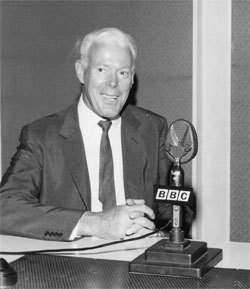Original thoughts June 1981
Trevor Leggett was head of the Japanese Department of the BBC.

This is one of his broadcasts to Japan
ZUBARI for June 1981
Original thoughts
Hello listeners!
Sometimes reading through essays by Konosuke Matsushita, I am struck by the freshness of the ideas and thoughts. Our university graduates, both in Britain and Japan, though of course differing sharply on many points, seem to agree on fundamentals. There is not much original thinking there.
I sometimes wonder whether originality of thought is crushed out of students at school and university. They have new thoughts, but they cannot formulate them properly. So, the teachers can easily ridicule them. After that, the students do not try to think for themselves, but simply learn to get marks and pass examinations.
I have noticed how often very small children, who have not yet been to school, can come out with brilliant thoughts which a grown-up would never think. For instance: we all assume that the principle of democracy, where the decision of the majority is accepted, is the best. The reason is said to be, that more people are made happy if the majority decision is adopted.
Now take this case. Four small children, aged 4 and 5, want to watch television. One boy, aged 4, wants to see a particular programme, but the other three all want another one. The parent says to the individual boy: “You must give way to the others, because the group wants the other programme. If you insist in your own programme you are being selfish.”
That seems to be decisive, doesn’t it? But he replied: “Why is it better for three people to be selfish than for one?”
This is a very good point. But we would never consider it in the adult world. He must have been a bright child, and his bright ideas had not yet been stifled by school.
There have been some British politicians without education who have done very well, though I admit, not many of them. The former Labour Foreign Minister, Ernest Bevin, was a man of little education; a friend of his once told me, “I doubt if he has read fifty books in his life.” But he had a very fine mind, and an overwhelming sincerity and honesty. Near the end of his life, he was very ill, but returned to the House of Commons, walking on two sticks. All the members of the House, Conservative and Labour alike, stood up in silence as he came in. This was a tribute to his great integrity, which even his opponents recognized.
A colleague of his, Aneurin Bevan, was also a man of very little education. He was a prominent figure in the Labour Party up to his death in July 1960 and he was Minister of Health when the Labour Government brought in the National Health Service, under which all could get free medical treatment.
© Trevor Leggett